Femia > Health Library > Getting Pregnant > Trying to conceive > 12 DPO: What to expect, and how to tell if you’re pregnant
12 DPO: What to expect, and how to tell if you’re pregnant
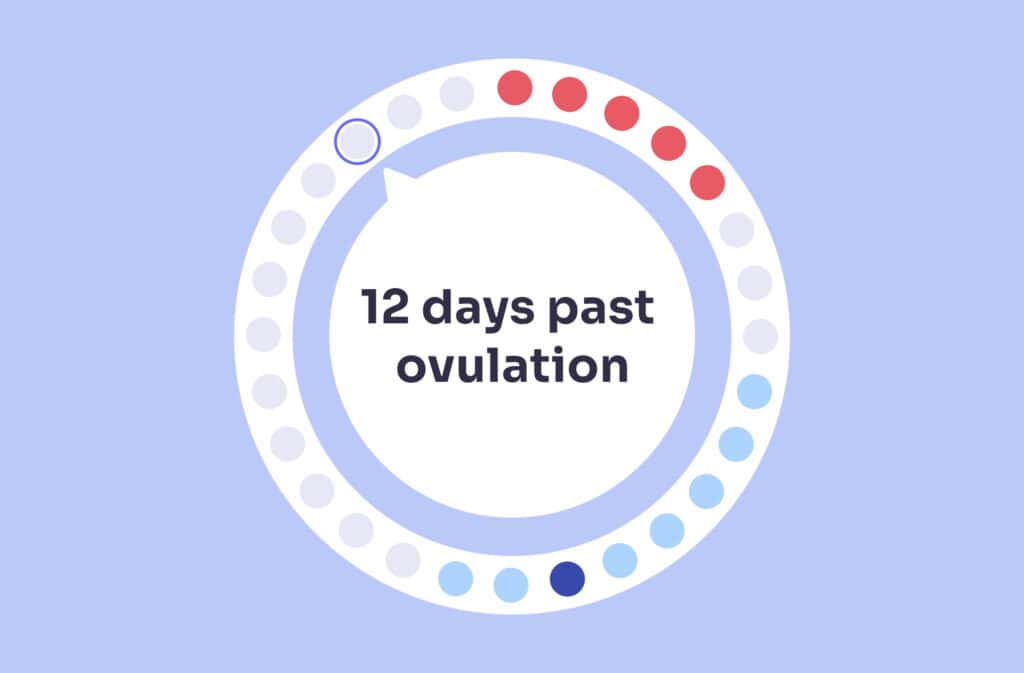
- Updated Feb 25, 2025
- Published
CRAFTED BY HUMAN
Crafted by human At Femia, we provide accurate and up-to-date information at every stage of your journey, from trying to conceive, pregnancy and postnatal support. All content is created by a real person based on in-depth research and own professional experience. Femia ensures that you will receive expert advice, strict accuracy and a personalized approach from our authors/medical experts. Learn more about our editorial policy.
FACT CHECKED
Fact checked At Femia Health, we maintain the highest standards of editorial excellence in delivering content focused on helping you conceive, guiding you through pregnancy, and supporting you postpartum. Explore our content review principles to learn how we ensure the accuracy and quality of our health and lifestyle tips for every stage of your journey.
At 12 DPO (12 days past ovulation):
- Implantation is complete if conception occurred.
- hCG levels are rising steadily if pregnant, making home pregnancy tests more reliable.
- Early pregnancy symptoms may be more pronounced for some women.
- 12 DPO symptoms can still be similar to PMS, but differences may become more apparent.
Welcome to 12 DPO! You’re now at a crucial point where pregnancy can often be detected. Let’s explore what’s happening in your body and what signs you might be experiencing at this exciting time.
➡️ Read other Femia guides in this series:
- 1 DPO: What to expect, and how to tell if you’re pregnant
- 2 DPO: What to expect, and how to tell if you’re pregnant
- 3 DPO: What to expect, and how to tell if you’re pregnant
- 4 DPO: What to expect, and how to tell if you’re pregnant
- 5 DPO: What to expect, and how to tell if you’re pregnant
- 6 DPO: What to expect, and how to tell if you’re pregnant
- 7 DPO: What to expect, and how to tell if you’re pregnant
- 8 DPO: What to expect, and how to tell if you’re pregnant
- 9 DPO: What to expect, and how to tell if you’re pregnant
- 10 DPO: What to expect, and how to tell if you’re pregnant
- 11 DPO: What to expect, and how to tell if you’re pregnant
- 13 DPO: What to expect, and how to tell if you’re pregnant
- 14 DPO: What to expect, and how to tell if you’re pregnant
- 15 DPO: What to expect, and how to tell if you’re pregnant
- 16 DPO: What to expect, and how to tell if you’re pregnant
What does 12 DPO mean?
12 DPO stands for “12 days past ovulation.” You’re now very close to the end of your luteal phase, the second half of your menstrual cycle. At this stage, your body is either supporting an early pregnancy or preparing for menstruation.
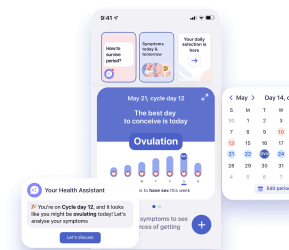
What's happening in your body at 12 DPO?
At 12 DPO, several key processes are likely occurring:
1. Hormone production
If you’re pregnant, your body is producing increasing amounts of human chorionic gonadotropin (hCG). This hormone supports the developing pregnancy and is what pregnancy tests detect.
2. Uterine changes
Your uterine lining remains thick and vascularized, ready to support a growing embryo if conception occurred.
3. Potential embryo development
If fertilization and implantation have taken place, the embryo continues to develop and grow, now firmly attached to the uterine wall.
12 DPO symptoms: What might you be experiencing?
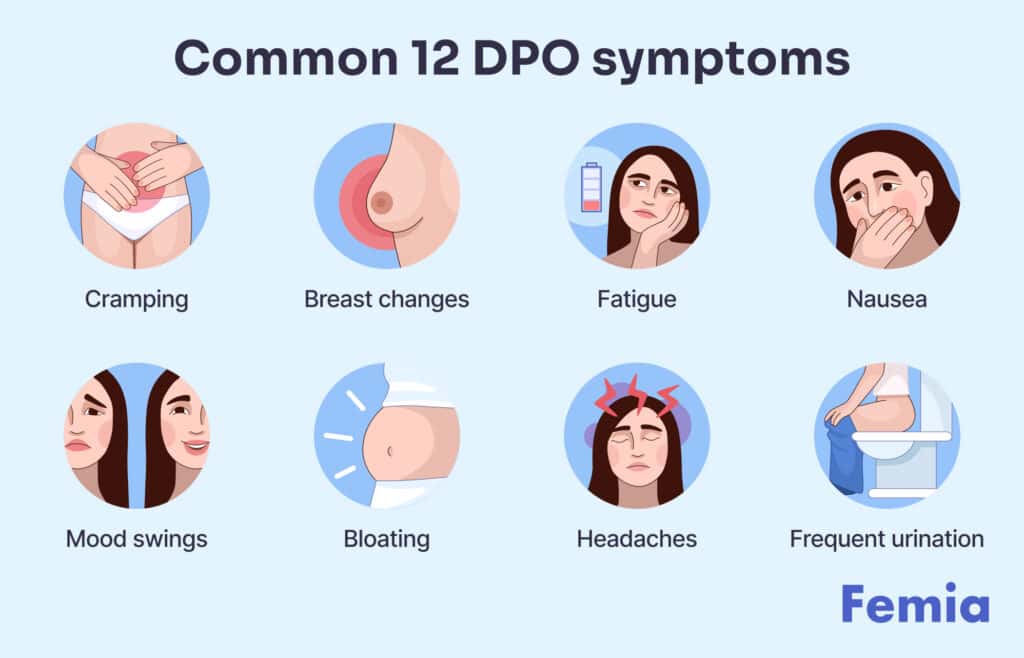
At 12 DPO, some women start to notice more pronounced early pregnancy symptoms, while others may still feel no different. Here are some common 12 DPO symptoms:
- Cramping: 12 DPO cramping can occur due to early pregnancy or premenstrual changes.
- Breast changes: Increased tenderness, swelling, or tingling in the breasts or nipples.
- Fatigue: Feeling more tired than usual is common in early pregnancy.
- Nausea: Some women may start experiencing mild nausea or food aversions.
- Mood swings: Hormonal changes can affect your emotions more noticeably.
- Bloating: You might feel puffy or bloated in your abdomen.
- Headaches: Mild headaches can occur due to hormonal shifts.
- Frequent urination: You might find yourself needing to use the bathroom more often.
12 DPO symptoms if pregnant
While every pregnancy is unique, some common 12 DPO symptoms if pregnant include:
- Mild lower abdominal cramping or twinges;
- Increased breast tenderness or sensitivity;
- Noticeable fatigue or tiredness;
- More frequent urination;
- Heightened sense of smell;
- Mild nausea or queasiness, especially in the morning;
- Mood swings or emotional sensitivity;
- Specific food cravings or aversions.
Remember, experiencing these symptoms doesn’t guarantee pregnancy, and not having them doesn’t rule out pregnancy.
👉Find out more: Fertility diet: What to eat to boost your chances of getting pregnant
12 DPO discharge if pregnant
At 12 DPO, you might notice changes in your vaginal discharge if you’re pregnant:
- Increased volume: You may produce more discharge than usual.
- Consistency: The discharge might be creamy or milky in texture.
- Color: Typically, it’s clear or white.
- Odor: Healthy discharge should have little to no odor.
Discharge can vary greatly between women and even from one cycle to another.
12 DPO: PMS or pregnant?
At 12 DPO, it can still be challenging to distinguish between early pregnancy symptoms and PMS. Here’s a comparison:
| Symptom | 12 DPO: pregnant | 12 DPO: PMS |
|---|---|---|
| Cramping | Often milder, may be intermittent | Can be more intense, similar to period cramps |
| Breast changes | Tenderness, possible darkening of areolas | Tenderness, usually improves after period starts |
| Mood changes | Can be more pronounced and persistent | Typically improves once period starts |
| Fatigue | May be more intense and ongoing | Usually improves after period starts |
| Nausea | Possible, may increase over time | Uncommon, but can occur |
| Food cravings/aversions | May be present and intense | Can occur, but usually less intense |
12 DPO implantation bleeding and spotting
Spotting at 12 DPO can be confusing. It could be:
- Late implantation bleeding: Although implantation typically occurs earlier, some women might experience late implantation bleeding around this time.
- Early signs of menstruation: Your period might be starting.
- Normal cycle variation: Some women experience mid-cycle spotting.
If the spotting is light and doesn’t develop into full menstrual flow, it could be a sign of early pregnancy. However, if it becomes heavier or is accompanied by pain, consult your healthcare provider.

with confidence
Femia offers personalized insights on ovulation, DPO symptoms,
and early pregnancy signs
Can I take a pregnancy test at 12 DPO?
Yes, 12 DPO is generally a good time to take a pregnancy test. Here’s why:
- hCG levels: By 12 DPO, hCG levels in pregnant women are typically high enough to be detected by most home pregnancy tests.
- Test accuracy: Many tests are designed to be accurate from the first day of a missed period, which is often around 14 DPO. Testing at 12 DPO gives you a good chance of an accurate result.
- Early detection: Some early detection tests can pick up very low levels of hCG, making them effective even at 12 DPO.
For the best results, use your first morning urine and follow the test instructions carefully.
👉Find out more: Evaporation line vs. faint positive: How to tell the difference on your pregnancy test
Questions from the Femia community
I'm experiencing cramping at 12 DPO. Could this be a sign of pregnancy?
Cramping at 12 DPO can indeed be a sign of early pregnancy. Some women experience mild cramps as the uterus begins to stretch and change. However, cramping can also be a sign of impending menstruation. If the cramps are severe or accompanied by heavy bleeding, consult your healthcare provider.
My breasts are very sore at 12 DPO. Is this a reliable pregnancy sign?
Breast soreness can be a sign of early pregnancy, but it can also be a PMS symptom. The key difference is often in the duration and intensity. Pregnancy-related breast changes tend to be more pronounced and persistent, while PMS-related soreness usually resolves once your period starts.
I had a negative test at 12 DPO. Is there still a chance I could be pregnant?
While 12 DPO is a good time to test, a negative result doesn't completely rule out pregnancy. Factors like late ovulation or slow-rising hCG levels can result in a false negative. If your period doesn't start, consider testing again in a few days or consult with your healthcare provider.
The bottom line
At 12 DPO, you’re at a point where pregnancy can often be detected through home tests. If you’re trying to conceive, this can be an exciting yet anxious time. Remember that while symptoms can provide clues, a pregnancy test is the most reliable way to confirm pregnancy at this stage.
Whether you’re hoping for pregnancy or not, it’s important to take care of your physical and emotional health. If you have any concerns about your symptoms or cycle, don’t hesitate to reach out to a healthcare professional for personalized advice and support.
➡️ Read other Femia guides in this series:
- 1 DPO: What to expect, and how to tell if you’re pregnant
- 2 DPO: What to expect, and how to tell if you’re pregnant
- 3 DPO: What to expect, and how to tell if you’re pregnant
- 4 DPO: What to expect, and how to tell if you’re pregnant
- 5 DPO: What to expect, and how to tell if you’re pregnant
- 6 DPO: What to expect, and how to tell if you’re pregnant
- 7 DPO: What to expect, and how to tell if you’re pregnant
- 8 DPO: What to expect, and how to tell if you’re pregnant
- 9 DPO: What to expect, and how to tell if you’re pregnant
- 10 DPO: What to expect, and how to tell if you’re pregnant
- 11 DPO: What to expect, and how to tell if you’re pregnant
- 13 DPO: What to expect, and how to tell if you’re pregnant
- 14 DPO: What to expect, and how to tell if you’re pregnant
- 15 DPO: What to expect, and how to tell if you’re pregnant
- 16 DPO: What to expect, and how to tell if you’re pregnant
References
- American College of Obstetricians and Gynecologists (ACOG). “Early Pregnancy Loss: Miscarriage and Molar Pregnancy.” ACOG Practice Bulletin, no. 200, 2018, pp. 1-10. The American College of Obstetricians and Gynecologists. https://www.acog.org/clinical/clinical-guidance/practice-bulletin/articles/2018/11/early-pregnancy-loss.
- “Luteal Phase, an overview.” ScienceSirect. https://www.sciencedirect.com/topics/medicine-and-dentistry/luteal-phase.
- American College of Obstetricians and Gynecologists. “Fertility Awareness-Based Methods of Family Planning.” ACOG Practice Bulletin No. 205, 2019. https://www.acog.org/womens-health/faqs/fertility-awareness-based-methods-of-family-planning.
- National Institutes of Health. “What are some common signs of pregnancy?” National Institute of Child Health and Human Development, 2017. https://www.nichd.nih.gov/health/topics/pregnancy/conditioninfo/signs.
- Gnoth, C., et al. “Time to Pregnancy: Results of the German Prospective Study and Impact on the Management of Infertility.” Human Reproduction, vol. 18, no. 9, 2003, pp. 1959-1966. https://pubmed.ncbi.nlm.nih.gov/12923157/.
- Mayo Clinic Staff. “Home pregnancy tests: Can you trust the results?” Mayo Clinic, 2022. https://www.mayoclinic.org/healthy-lifestyle/getting-pregnant/in-depth/home-pregnancy-tests/art-20047940.
- U.S. Food and Drug Administration. “Pregnancy.” FDA, 2019. https://www.fda.gov/medical-devices/home-use-tests/pregnancy.
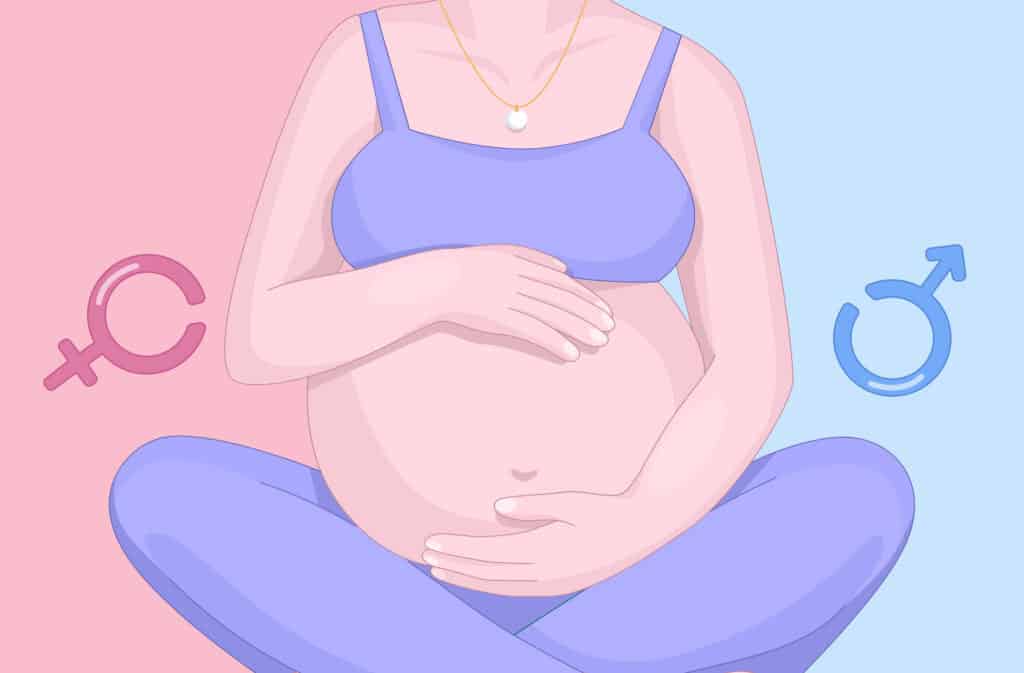
Curious about whether pregnancy symptoms can predict your baby’s sex? Discover the myths and facts about boy vs. girl pregnancy symptoms, and what science says about gender predictions.
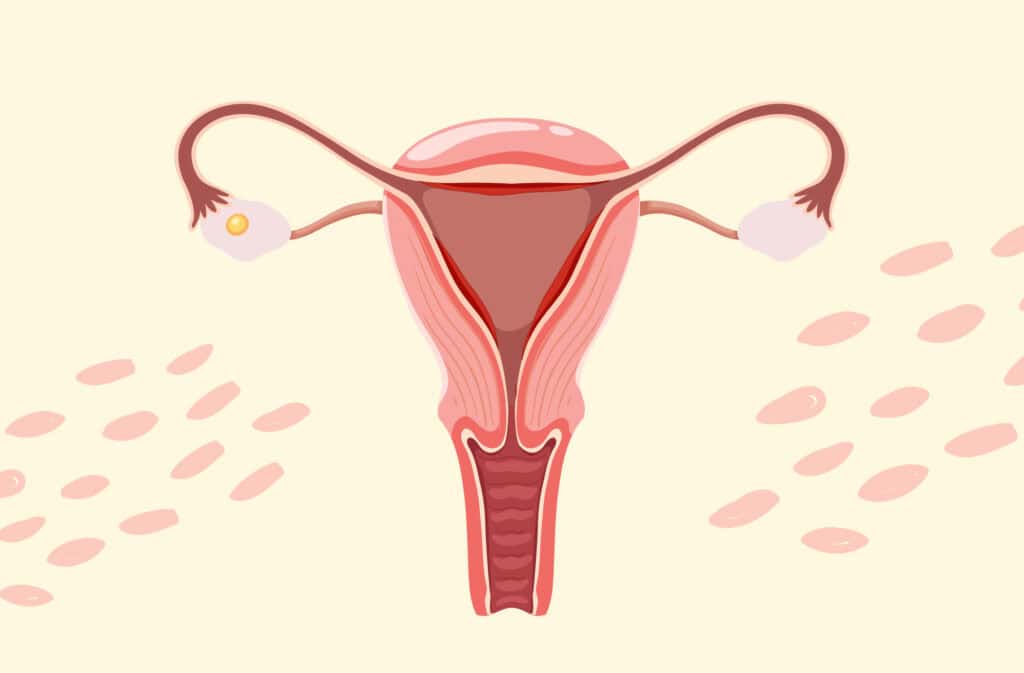
Learn about the follicular phase, its symptoms, and how to optimize your diet for better health. Discover key foods, hormonal changes, and tips for improved fertility and wellness.

Bleeding during sex is a common complaint and is generally nothing to worry about. However, some cases require medical attention to treat the underlying cause.

